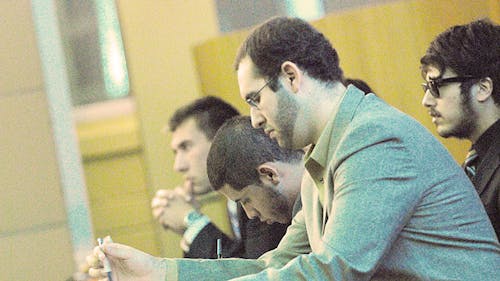RUSA votes down contested legislation

A fiery debate over whether the Rutgers University Student Assembly should pass a bill to join the United States Student Association ended in a room-silencing decision.
RUSA, which held its bi-weekly meeting at the Student Activities Center on the College Avenue campus yesterday, voted 49 percent to 41 percent, with 10 percent abstaining, to not join the USSA.
"I was hoping for [the bill] to get voted down," said Yousef Saleh, president of RUSA. "I expected this big debate to happen … I just wish we had the presentation [on USSA] and people had time to think about it."
The USSA is the country's oldest and largest national student-lead organization focusing on the development of student leaders and student voices at the local, state and national level, said Lindsay McCluskey, the organization's president.
McCluskey, who was disappointed that the bill was voted down, looks forward to working with the University in the future.
"I think there is interest and a lot of people that want to know more, and I hope we have the opportunity to build a relationship with RUSA moving forward," she said.
The debate prior to the vote displayed many different opinions on the topic.
Proponents expressed the potential for advocacy and development of statewide student associations while opponents spoke of the cost, lack of information on the topic and lack of administrative support.
The bill, if passed, would have required a USSA membership of more than $7,000, or roughly 15 percent, of the RUSA budget.
RUSA Treasurer Anthony Weigand spoke against passing the legislation because of restrictions set on RUSA allocations, which restrict using student fees to pay membership fees as well as other issues that may arise.
"We have asked the administration if we would be breaking any laws by using student fees to join this organization — legal council is still looking into that," Weigand said.
Gordon Morrisette, director of policy at the Roosevelt Institute, drafted a document at the request of RUSA on the bill passing.
"I was approached to do some research on this and see if I thought — and the Roosevelt Institute thought — it was a good idea to do this," said Morrisette, a School of Arts and Sciences sophomore.
Morrisette advocated for the passing of this bill, saying the amount of money going to USSA was negligible compared to the amount RUSA would be allocating for other organizations. He also added his personal reasons for supporting the bill.
"Rutgers will not unite because it is apathetic and the reason it is apathetic is because the voice of you and the voice of the student body has been cut off," he said.
He believes the administration is parenting the student body and wants to see students make their voices heard.
"Until you seize the initiative to make the decisions that benefit you and your constituency the students will remain apathetic," Morrisette said.
While some students remain apathetic, Bhavin Patel, the president of the Roosevelt Institute, was outspoken about his disappointment with the meeting.
"It was a crap shoot, it was s—t, essentially," Patel said. "People came to the first issue on the agenda which was USSA and then left. They came to attend a contentious issue which revolved around money and then they left and left over $50,000 that was appropriated afterwards."
He said it was disrespectful the way members walked out and neglected their responsibility to the students.
"They left without deliberating … and dropped $50,000 just like that," Patel said.
Jack Yoon, Legislative Affairs chair for RUSA, drafted the bill and was not surprised with the progression of the evening.
"Last meeting the body caused a lot of commotion over $100, so obviously I expected many times over that for $7,200," said Yoon, a School of Arts and Sciences junior.
He was surprised the body would turn down an organization that solely benefited students but is not ready to give up.
"We will now be following the advice of the body to produce some substantial results of RUSA by itself and work with the administration to get everybody on the same side," Yoon said. "I think we will be a member of the USSA in the near future."
John Aspray, Internal Affairs chair for RUSA, was a big proponent for passage of the bill and was disgusted with the way the meeting went.
"There were motions that were put forth that came from folks that know parliamentary procedure … and they were shouted down by the chair," said Aspray, a School of Arts and Sciences senior. "Two of the three people that spoke to the bill filled it with diatribes and tirades against the bill."
He does have a question for the student body, "Would you like to join the United States Student Association?"



